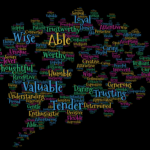De-stressing Mindfully
Heal Your Life by Carolle Jean-Murat
Stress is inevitable in our lives. But when you are over-stressed, it will cause emotional and physical symptoms, from anxiety to cancer. Emotional and physical symptoms are a warning signal – a way your body communicates with you.
A symptom is the tip of the iceberg, pointing to something deeper; true healing can only occur when the root cause is found and dealt with. Listen to your body when it lets you know you’re over-stressed. It is your inner wisdom talking to you.
When you feel stressed, make time to take a “life inventory.” Figure out what your strongest stress triggers are. They usually involve your outlook on life, and imbalance in your personal relationships, work/career, finances, or your lack of spiritual health.
Are you in the right relationship? Is your present job a good fit for you? Stress can be related to your environment or to the side effects of a medication. Good mental health depends on healthy relationships that nurture you. This means establishing healthy boundaries in all of them.
Know your limitations when it comes to your work and career. Is it the major stressors in your life? Are you doing what you love? Does it fulfill your needs and that of those you love? Do you have all the tools you need? Do you need to ask for help?
It is very important to acknowledge how you respond when under stress. See if you deal with it in a negative manner by doing things such as overeating, over-exercising, or using mood-altering substances., etc.
Please have faith, and trust that you will be taken care of, no matter what, in spite of how things may look. Don’t be like the many individuals who stay in unfulfilling jobs or relationships until they become very sick and reach a point of no return. Please practice believing deep within yourself that you deserve better …. and that when a door closes, another one always opens for your highest good.
Steps for de-stressing mindfully include, bio-feedback, yoga, getting a massage, exercising, herbal teas, a a relaxing bath, time alone or with a friend or a pet or a loved one. Others, such a meditation, listening to music and reading.
“Leave the past behind, so you can be free to enjoy the present.” Live in the moment; don’t waste time dwelling in the past. I choose how I live my life moment by moment.”
Transitioning Through Autumn and Winter
When we take the time to reflect upon the natural environment, we begin to observe a complex yet very beautiful world cycling through patterns, phases and through stages of transition. We also quickly realize that nothing ever stands still, that nothing every maintains its current state, identity or shape for very long. In fact, all nature cycles through seasons of change and transformation, effortlessly and naturally – just like humans transition through psychological and physical states of transformation throughout our lives.
Autumn : A season for survival, mistakes, and problems.
Winter: A season for reflection, hibernation, and planning
The Season of Autumn
 The Autumn season is a time for survival, for dealing with problems and for making mistakes. It encapsulates moments of your life where you struggled to maintain the momentum that was required to achieve your goals and objectives. Consequently, things started to fall apart, you felt like you had very little control over your circumstances, and you began to react emotionally in very limiting ways.
The Autumn season is a time for survival, for dealing with problems and for making mistakes. It encapsulates moments of your life where you struggled to maintain the momentum that was required to achieve your goals and objectives. Consequently, things started to fall apart, you felt like you had very little control over your circumstances, and you began to react emotionally in very limiting ways.
Characteristics of Autumn
Throughout Autumn you will find yourself undertaking the following activities:
- Avoiding responsibility
- Contracting your comfort zone
- Hesiitating
- Thinking unrealistically, ineffectively and pessimistically
The Psychology of Autumn
Throughout autumn you will tend to experience the following emotions:
- Anger
- Anxieety
- Frustration
- Stress
- Disappointment
- Overwhelm
The Evolution of Autumn
The Autumn season doesn’t occur by coincidence. There are certain factors that come into play that naturally enable us to transition through this phase of life. These factors include:
- Ineffective decision-making
- Failure to capitalize on opportunities
- Ignormance
- Mistakes stemming from ineffective thinking
- Mistakes originating from limiting habits of behavior
Self-Reflection Questions
Reflect back upon the Autumn seasons of your life and honestly ask yourself the following set of questions:
What impact have the Autumns had on my life?
What have they taught me about myself, life and others?
How have they transformed my personality?
The Season of Winter
 The Winter Season is a time for self-reflection, planning, and hibernation. It encapsulates moments of your life when you began to withdraw emotionally from the world and from your circumstances. This naturally brought about periods of self-reflection and contemplation where you were able to re-clarify your life’s purpose and consequently forgive yourself for past mistakes and indiscretions.
The Winter Season is a time for self-reflection, planning, and hibernation. It encapsulates moments of your life when you began to withdraw emotionally from the world and from your circumstances. This naturally brought about periods of self-reflection and contemplation where you were able to re-clarify your life’s purpose and consequently forgive yourself for past mistakes and indiscretions.
Characteristics of Winter
Throughout Winter you will find yourself undertaking the following activities:
- Time for finding inner peace and solitude
- Time for bonding with family, friends and loved ones
- Time for journaling thoughts and feelings
- Time for thinking critically, realistically, problematically and thoughtfully about life
The Psychology of Winter
Throughout Winter you will tend to experience a mix of pessimistic and optimistic emotions that naturally tend to trigger a state of procrastination:
- Guilt
- Fear
- Relief
- Grief
- Hope
The Evolution of Winter
The Winter season doesn’t occur by coincidence. There are certain factors that come into play that naturally enable us to transition through this phase of life. These factors include:
- Lack of emotional intelligence
- Reactive behavior to losses and uncontrolled circumstances
- Ineffective choices, habits, and thoughts
Self-Reflection Questions
Reflect back upon the Winter Seasons of your life and honestly ask yourself the following set of questions:
What impact have the Winters had on my life?
What have they taught me about myself, life and others?
How have they transformed my personality?
This is a great time of year for Personal Transformation through the Yuen Method. If you haven’t experienced Personal Transformation/Yuen Method, call your a free intuitive 30 min session to see amazing possibilities that await for you. 403-358-2362
Positive Balancing Thoughts
You begin saving the world by saving one person at a time. – Charles Bukowski –
My courage always rises at every attempt to intimidate me. – Jane Austen –
The sound of laughter is like the vaulted dome of a temple of happiness. – Milan Kundera –
Things turn out best for the people who make the best out of the way things turn out. – Art Linkletter –
Be happy with what you have and are, be generous with both you won’t have to hunt for happiness. – William E. Gladstone –


